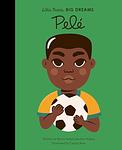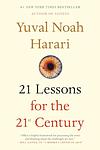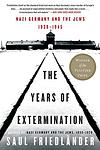The Greatest Israeli, Brazilian "Nonfiction" Books Since 1950
Click to learn how this list is calculated.
This list represents a comprehensive and trusted collection of the greatest books. Developed through a specialized algorithm, it brings together 300 'best of' book lists to form a definitive guide to the world's most acclaimed books. For those interested in how these books are chosen, additional details can be found on the rankings page.
Genres
Countries
Date Range
Reading Statistics
Click the button below to see how many of these books you've read!
Download
If you're interested in downloading this list as a CSV file for use in a spreadsheet application, you can easily do so by clicking the button below. Please note that to ensure a manageable file size and faster download, the CSV will include details for only the first 500 books.
Download-
1. Sapiens: A Brief History of Humankind by Yuval Noah Harari
This book provides a comprehensive exploration of the history of the human species, tracing back from the earliest forms of Homo Sapiens to the modern day. It delves into evolutionary biology, the development of cultures and societies, and the rise of major ideologies and technologies. The book also discusses the future of the species, posing thought-provoking questions about our roles and responsibilities in a rapidly changing world.
-
2. Thinking, Fast and Slow by Daniel Kahneman
The book delves into the two systems that drive the way we think—System 1, which is fast and intuitive, and System 2, which is slow and deliberate. The author, a Nobel laureate, explores how these systems shape our judgments and decision-making. He presents several groundbreaking experiments that have shaped our understanding of human thought, revealing where we can trust our intuitions and how we can tap into the benefits of slow thinking. The book also discusses how our cognitive biases often lead to errors in judgment and affect our decision-making processes.
-
3. Child Of The Dark by Carolina Maria De Jesus
The book is a powerful and harrowing diary that provides an unflinching look at the brutal realities of life in the favelas of São Paulo, Brazil, through the eyes of a struggling single mother. The author documents her daily fight for survival and that of her children, as they contend with hunger, poverty, and the constant threat of violence. Her poignant observations and raw emotional honesty offer a deeply personal insight into the systemic social injustices and the resilience of the human spirit in the face of overwhelming adversity.
-
4. Os Nacionalismos Africanos by Mario de Andrade
"Os Nacionalismos Africanos" explores the rise of African nationalism during the mid-20th century, delving into the various factors that fueled the movement across the continent. The book examines the impact of colonialism, the emergence of Pan-Africanism, and the struggles for independence experienced by African nations. Through a meticulous analysis of historical events and political ideologies, the author provides a comprehensive understanding of the complex dynamics that shaped African nationalism and its enduring legacy in the post-colonial era.
-
5. Homo Deus by Yuval Noah Harari
This book explores the future of humankind, building upon the foundation laid by its exploration of our past. It delves into the potential paths humanity might take as technological advancements and artificial intelligence begin to challenge the very essence of what it means to be human. The narrative posits that as we conquer famine, war, and plague, our focus shifts towards achieving happiness, immortality, and divinity, raising profound questions about our future roles and values in a world where machines and algorithms might outperform us in thinking, making decisions, and understanding the universe. Through a blend of philosophy, history, and future-gazing, the book invites readers to consider the implications of such a future, both exhilarating and daunting.
-
6. Pedagogy Of The Oppressed by Paulo Freire
This book is a seminal work in the field of critical pedagogy that explores the complex relationship between the oppressor and the oppressed in educational contexts. The author argues that traditional pedagogical methods perpetuate existing hierarchies and suggests a new approach called "problem-posing education," which emphasizes dialogue and critical thinking to empower learners to question and challenge oppressive systems. The text is both a critique of the way education is often used as a tool of domination and a guide for how it can instead be transformed into a practice of freedom, helping individuals to achieve self-realization and societal change.
-
7. My Life by Golda Meir
The book is an autobiography of one of the most influential women in modern history, who rose from the poverty of her childhood in Russia and Milwaukee to become the Prime Minister of Israel. It offers a compelling account of her role in the founding of the state of Israel and its early years, providing personal insights into the myriad political and military challenges the nascent country faced. The narrative is interwoven with her own life story, including her experiences with immigration, education, and her rise through the ranks of the labor movement and political leadership, all set against the backdrop of the 20th century's tumultuous events leading up to and following the establishment of Israel.
-
8. My Life And The Beautiful Game by Pele
The book is an autobiography by one of the greatest soccer players of all time, who shares his journey from the streets of Brazil to becoming a global sports icon. The narrative delves into his profound love for soccer, detailing his career highlights, personal life, and the challenges he faced along the way. It also explores his role in popularizing soccer across continents and his enduring impact on the sport, providing insights into his philosophy both on and off the pitch. The autobiography is not only a reflection on his illustrious career but also an inspirational story of dedication, passion, and the transformative power of sports.
-
9. Pele: The Autobiography by Pele
In this autobiography, the legendary Brazilian footballer recounts his journey from a young boy with a passion for the game to becoming one of the most iconic figures in the sport's history. He shares insights into his upbringing, the challenges he faced, and the triumphs he experienced throughout his illustrious career. The book delves into his record-breaking achievements, including three World Cup victories, and his role in popularizing football across the globe. It also offers a personal look at his life off the pitch, including his contributions to various social causes and the legacy he hopes to leave behind for future generations of athletes.
-
10. The Upside Of Irrationality by Dan Ariely
The book explores the counterintuitive ways that irrational behaviors shape our lives and influence our decisions, from the workplace to personal relationships. The author, a behavioral economist, uses a mix of experiments, case studies, and anecdotes to demonstrate how understanding these irrational forces can lead to better outcomes in various aspects of life. By examining topics such as the effects of high bonuses on performance, the motivations behind revenge, and the impact of adaptation on happiness, the book provides insights into how we can harness irrationality for positive change and improved decision-making.
-
11. 21 Lessons For The 21st Century by Yuval Noah Harari
This book navigates through the complexities and challenges of the 21st century, offering insightful analysis and thought-provoking lessons on various pressing issues such as technology, politics, religion, and education. The author delves into the impact of artificial intelligence and biotechnology, exploring how they are reshaping the world and questioning the future of humanity in this rapidly changing landscape. Through a series of compelling essays, the book encourages readers to reflect on the values, meaning, and personal engagement in a world full of noise and uncertainty, aiming to equip society with the understanding and wisdom to navigate the unknown future.
-
12. The Years of Extermination by Saul Friedlander
"The Years of Extermination" is a comprehensive historical analysis of the Holocaust, examining the genocide from 1939 to 1945. Drawing on a variety of sources, including diaries, letters, and firsthand accounts, it provides a detailed and harrowing account of the systematic extermination of the Jewish people during World War II. The book also explores the responses of various groups, including the Jewish communities in Europe, the international community, and the perpetrators themselves.
Reading Statistics
Click the button below to see how many of these books you've read!
Download
If you're interested in downloading this list as a CSV file for use in a spreadsheet application, you can easily do so by clicking the button below. Please note that to ensure a manageable file size and faster download, the CSV will include details for only the first 500 books.
Download









